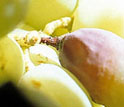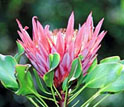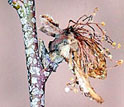Session Announcement: Ecology and Epidemiology
Keynote speaker: Dr. Yigal Elad
 Botrytis
cinerea and other Botrytis species are important pathogens
of nursery plants, vegetable, ornamental, field and orchard crops. Bulbs,
seeds and other propagation material also suffer infection. One intriguing
phenomenon associated with Botrytis infection is the ability
of this pathogen to be quiescent in the host tissue for varying periods
either during the crop growing season or post-harvest. The rapid conidia
germination, infection, mycelium growth and conidiation occur under
a wide range of microclimate conditions and pose severe disease management
problems all around the world. Moreover, the ability of B. cinerea
to be active at temperature as low as 0°C makes it also an important
and challenging pathogen during storage and shipment. Nevertheless,
the limiting factor for epidemic outbreaks is usually the occurrence
of the appropriate microclimatic conditions, rather than the amount
of inoculum. The production of high numbers of conidia poses a long
lasting threat to susceptible hosts. It was claimed that infection can
occur only in high relative humidity conditions. Indeed, the role of
water films and nutrients in germination and infection has been long
recognized. However, it is interesting that the pathogen adapted itself
to infect plants when no visible water film occurs. Penetration of leaves
and stems, floral organs and wounds of various ages and consequences
of ecological niche change in host crops will be demonstrated. Detailed
studies on the precise conditions that promote infection, disease development
and survival of inoculum have provided the essential epidemiological
information required for the design of control strategies. For example,
cultural methods have been developed that increase aeration and drying
of the plant canopy to reduce the risk of Botrytis epidemics.
Rational warning systems based on conditions highly conducive to conidia
germination and host penetration for disease development have been developed
for some crop systems. Botrytis
cinerea and other Botrytis species are important pathogens
of nursery plants, vegetable, ornamental, field and orchard crops. Bulbs,
seeds and other propagation material also suffer infection. One intriguing
phenomenon associated with Botrytis infection is the ability
of this pathogen to be quiescent in the host tissue for varying periods
either during the crop growing season or post-harvest. The rapid conidia
germination, infection, mycelium growth and conidiation occur under
a wide range of microclimate conditions and pose severe disease management
problems all around the world. Moreover, the ability of B. cinerea
to be active at temperature as low as 0°C makes it also an important
and challenging pathogen during storage and shipment. Nevertheless,
the limiting factor for epidemic outbreaks is usually the occurrence
of the appropriate microclimatic conditions, rather than the amount
of inoculum. The production of high numbers of conidia poses a long
lasting threat to susceptible hosts. It was claimed that infection can
occur only in high relative humidity conditions. Indeed, the role of
water films and nutrients in germination and infection has been long
recognized. However, it is interesting that the pathogen adapted itself
to infect plants when no visible water film occurs. Penetration of leaves
and stems, floral organs and wounds of various ages and consequences
of ecological niche change in host crops will be demonstrated. Detailed
studies on the precise conditions that promote infection, disease development
and survival of inoculum have provided the essential epidemiological
information required for the design of control strategies. For example,
cultural methods have been developed that increase aeration and drying
of the plant canopy to reduce the risk of Botrytis epidemics.
Rational warning systems based on conditions highly conducive to conidia
germination and host penetration for disease development have been developed
for some crop systems.
In the Ecology and Epidemiology session, presentations will address,
among others, different aspects in grapes and other crops, related to
eenvironmental and nutritional factors influencing the activation and
spread of quiescent infections; interdependent effects of climate and
vegetative growth on grey mould incidence; infection of flowers and
fruits in relation to weather conditions and fruit age; Thrips as a
vector of Botrytis to flowers, systemic infection; Inoculum
ecology; Predicting the seasonal risk and forecast of Botrytis
infection risk; competitive colonisation of B. cinerea and
other species.
Details of the speaker:
Dr. Yigal Elad
Department of Plant Pathology and Weed Research, The Volcani Center,
Bet Dagan 50250, Israel;
E-Mail: elady@volcani.agri.gov.il
Biography:
1974-1977: B.S. with honors in Agriculture. The Hebrew University of
Jerusalem (HUJI);
1978: M.Sc. HUJI on biological control of Sclerotium rolfsii with
Trichoderma harzianum;
1979-1983: Ph. D. on the mechanism of biological control of soil borne
plant pathogens by Trichoderma harzianum;
1983-1984: Visiting Scientist, Colorado State University, Dept, of Botany
and Plant Pathology - interaction of Pseudomonads with Fusaria;
1984 1985: researcher, HUJI, Department of Microbiology and Plant Pathology
on biocontrol of Pythium aphanidermatum with bacteria;
1992: Visiting scientist at IPO DLO, Wageningen, The Netherlands on
suppression of infection and sporulation of Botrytis cinerea;
2002-2003: Honorary Scientific Research Fellow at Birkbeck, University
of London on interaction between host plant, biocontrol agent, pathogen
and indigenous microflora; 1998-2002: Head, Dept. of Plant Pathology,
The Volcani Center, Israel
2002- : Head, Plant Pathology Unit, Centre for research and development
of crop protection with low environment and consumer-health impact,
SafeCrop, Istituto Agrario di S. Michele all'Adige IASMA, Trentino,
Italy;
1998- : Convenor of the IOBC/WPRS working group of biocontrol of plant
pathogens;
2006- : Scientific head of R&D Central and North Arava, Israel.
Current research priorities: Diseases of covered crops; foliar diseases;
chemical, biological and integrated control; epidemiology; parasitism
and physiology of the diseased plant.
Important
Symposium Dates
20 Aug: Deadline for Early Bird registration and accommodation
reservations at special Symposium rates.
7 Sept: Final day for registration and payment of presenting
authors. We do, however, urge authors to register and pay their registration
fee by 20 August in order to qualify for the early bird registration fee.
PLEASE NOTE that abstracts by presenting authors who have not
registered and paid by 7 September, will be removed from the official
programme and book of abstracts.
1 Oct: Final day for Secretariat to receive registrations.
21 - 26 Oct: 14th International Botrytis
Symposium.
Please
contact the Symposium Secretariat should you require any information or
assistance.
Tel + 27 21 886 4496 Fax +27 21 883 8177
Email: conf@conferencesetal.co.za
and deidre@iafrica.com
Conferences et al
P O Box 452
Stellenbosch
7599
Tel 27 21 886 4496
Fax 27 21 883 8177
Website: www.conferencesetal.co.za
For more information on the The XIV International Botrytis Symposium please
visit the website at
http://academic.sun.ac.za/botrytis2007
Main
sponsor: Bayer CropScience
Sponsors:
BASF, DFPT Research, Inqaba Biotech, Sigma-Aldrich, Separation Scientific,
Cape Biotech, Philagro, ABSA, Winetech, SAWWV,
NRF
Exhibitors:
Bayer CropScience, Inqaba Biotech, BASF, Separation Scientific, Pocket
Diagnostics, FieldClimate
|






